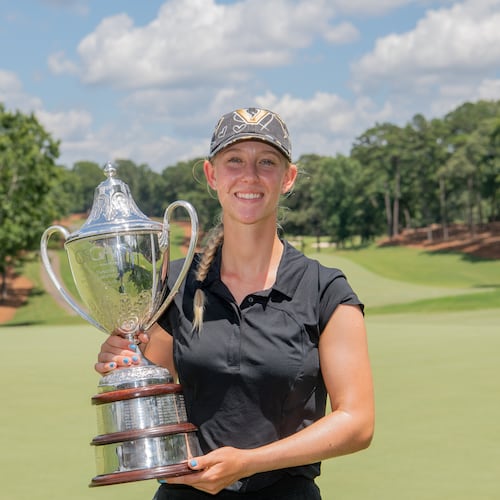A new twist to this year’s The Atlanta Journal-Constitution Peachtree Road Race is more than a clever fundraiser. It is insight into the future of the race and the Atlanta Track Club under the leadership of its first-year executive director.
Marathoner Meb Keflezighi, who in April became the first American man to win the Boston Marathon since 1983, will start the 10-kilometer race dead last in the 60,000-runner field on Independence Day. Based on the numbers of runners he can pass, he’ll raise money for the track club’s youth running program, Kilometer Kids.
Beyond that, though, Keflezighi’s unusual role in the 45th running of this Atlanta institution will provide participants and fans much more value than if he had been an invited runner at the head of the pack.
Rich Kenah, who assumed leadership of the track club and the race in February, envisions Peachtree finishers sharing their accounts at Fourth of July barbecues and in their offices the following Monday about running with Keflezighi, how an American track legend literally competed with them.
“Then we’ve enriched the experience that people have at this year’s Peachtree,” Kenah said. “That’s what this is about, the AJC Peachtree Road Race being special, something different, doing something more for runners this year.”
A memorable experience might lead a first-time Peachtree runner to register again next year or inspire a walker to become a runner. It is part of the more outward-facing vision that the track club developed in re-examining its purpose in its 50th year, a yearlong process that attracted Kenah to the club and likewise made the former Olympian and longtime sports marketer a fit for the job.
“Quite simply, it’s to help create more active and fit Atlantans through running and walking,” Kenah said. “So, to create a culture where you’d want to run a race more than just that once a year.”
Kenah, 43, has spent his career selling his sport. Even during his competitive career, which peaked with two bronze medals in the 800 meters the world indoor and outdoor championships in 1997 and a spot in the 2000 Olympics, Kenah worked at a sports agency. He later landed at a Boston-based agency and sports marketer, where he oversaw two indoor track meets in Boston and New York that achieved the sport’s elusive prize of nationally-televised broadcasts.
With that mindset, Kenah made a noteworthy change to the elite field for this year’s Peachtree. While the race has hosted the USA Track and Field 10K championship in the past, Kenah pushed all of the prize money to American runners, essentially eliminating non-American elites from the race. The Peachtree has been dominated by internationals — an American male last won the race in 1991 — relegating past U.S. champions to the background.
“My feeling this year is that it’s really hard for the television audience, the spectators and the runners on the street to understand who’s American, who’s not American when you have the U.S. championship race,” he said. “So this year, it was about celebrating the American championship.”
Kenah’s idea for the 2015 race is to assemble a field to run the fastest-ever 10K. The men’s and women’s Peachtree records — 27 minutes, 4 seconds and 30:32, respectively — are both within 20 seconds of the fastest 10K races in history. The idea germinated from Kenah’s belief that competition and narrative are at the core of his sport.
“I think that maybe if there’s one significant shift for us this year, it’s, let’s talk about what the race is,” he said. “Are you running against yourself to prove that you can run your first 10K? Are you running against the clock? Are you running for an American championship? Are you running for a charity? What are you running for?”
Kenah’s push to sell the sport, to spectators, runners and ideally would-be runners, is a next step for the club and the Peachtree. Kenah’s predecessor, Tracey Russell, made a number of adjustments to the race in her seven-year tenure, largely with the objective of improving the experience for the 60,000 participants in the world’s largest 10K.
“Everybody appreciates the evolution of the event, including under Tracey’s stewardship with the club,” said Bill Duffey, chairman of the board for the track club and a member of the committee that hired Kenah. “I think Rich came in and said, ‘This is an incredibly great platform to think about what more can we do to engage people.’”
Kenah tried a similar tack in April with the “Peachtree Jr.,” a kids race at Piedmont Park. The club invited four local Olympians, all with world championships to their credit, and had them greet finishers, share their message and introduce them to their events. Duffey raved about the enthusiastic response from the young runners and called it a transformation of the 28-year-old event.
“I’m bullish on the use of Olympic athletes (to promote the sport),” Kenah said. “I love the idea of using Olympic athletes to inspire young kids like we did at Peachtree Jr.”
Kenah, who runs about 30 miles a week and estimates he could run a sub-37 minute Peachtree, is contemplating various opportunities to introduce more people in metro Atlanta to running and walking. Earlier this month, the club collaborated with the Braves on a 5K race that finished at Turner Field with the idea of attracting Braves fans to road racing and road racers to the Braves.
With the popularity of themed races, where participants might wear costumes, run through obstacle courses or mud or get splattered with paint, the track club is considering possibilities for races while staying true to its heritage.
“We’ve got a lot of fun ideas that we’d like to do,” Kenah said.
Perhaps that sums up his challenge — convincing 6 million metro Atlantans that running can be fun.
About the Author
Keep Reading
The Latest
Featured



